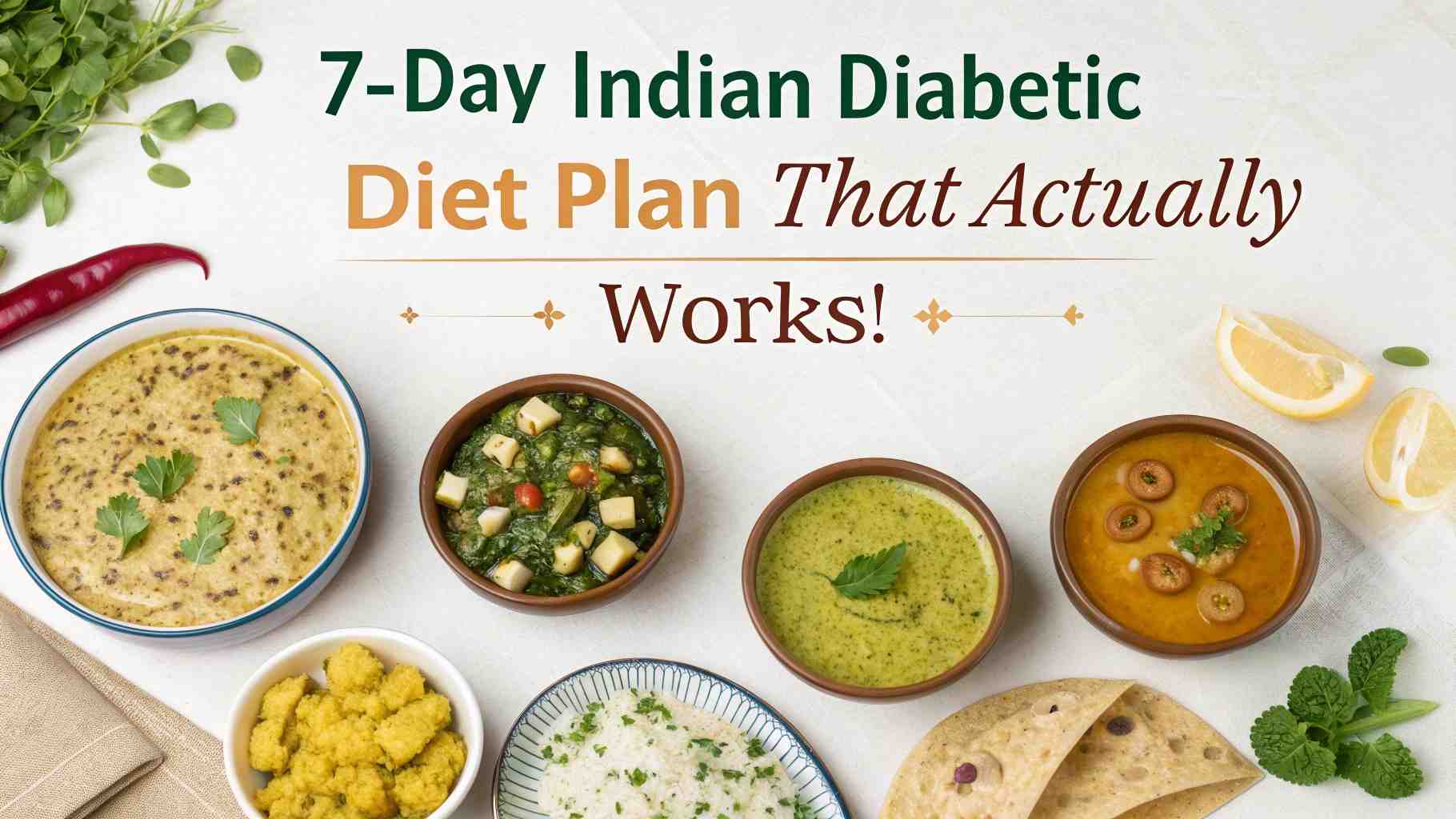7-Day Indian Diabetic Meal Plan: Eat Well, Stay Balanced with Expert Guidance
Verified By Ms. Smita Jaiswal | 20-Mar-2025
Managing diabetes requires more than just medication—it demands a mindful approach to nutrition. According to the 2023 ICMR Guidelines, over 101 million Indians live with diabetes, and a balanced diet is critical to preventing complications like neuropathy and cardiovascular disease. In this article, Ms. Smita Jaiswal, Consultant Dietitian & Certified Diabetes Educator at Kailash Hospital, Noida, shares a science-backed 7-day Indian diet plan for diabetic patients, designed to stabilize blood sugar, boost energy, and satisfy your taste buds.
Ms. Smita Jaiswal emphasizes, "A balanced diet tailored to individual needs is crucial for diabetes management. It helps in controlling blood glucose levels and preventing complications."
Whether you’re looking for a diabetic weekly diet plan or searching for the best Dietician/Diabetes Educator in Noida, this guide empowers you to take control of your health.
Table of Content
Diabetes mellitus is a long-term condition where blood sugar levels are higher than normal because the body can't produce enough insulin or use it properly. Diet plays a pivotal role in managing diabetes by influencing blood glucose levels, weight, and overall health. Ms. Jaiswal advises, "Incorporating foods with a low glycemic index, rich in fiber and nutrients, can aid in better blood sugar control."
Uncontrolled blood sugar spikes can damage organs over time. Ms. Jaiswal explains, “A consistent diabetic menu plan for a week helps regulate glucose levels, reduces HbA1c, and prevents cravings. For Indian patients, balancing carbs like roti and rice with protein and fiber is key.”
Also read: How Does Diabetes Cause Hypertension?
- Carbohydrate Control: Opt for complex carbohydrates like whole grains, legumes, and vegetables to prevent rapid spikes in blood sugar.
- Fiber-Rich Foods: High-fiber foods help slow glucose absorption, aiding in blood sugar regulation.
- Lean Proteins: Include sources like fish, poultry, tofu, and legumes to support muscle health and satiety.
- Healthy Fats: Incorporate monounsaturated and polyunsaturated fats from sources like nuts, seeds, and olive oil.
- Portion Control: Eating moderate portions helps manage calorie intake and maintain a healthy weight.
- Regular Meal Timings: Consistent meal timings assist in stabilizing blood sugar levels throughout the day.
“A study in Diabetes Care showed that a high-fiber diet reduces fasting glucose by 10–12%,” shares Ms. Jaiswal.
This plan focuses on low-glycemic foods, portion control, and regional Indian flavors.
Day 1
- Breakfast: Moong dal chilla (2) with mint chutney + Lemon water (No Sugar)
- Mid-Morning: 1 small guava + handful of mixed nuts (almonds and walnuts).
- Lunch: Two multigrain rotis, mixed vegetable curry, a bowl of dal, and a cucumber-tomato salad + Curd
- Evening Snack: Roasted Chana or makhana (fox nuts).
- Dinner: Paneer/ Chicken curry + sautéed bhindi and a small serving of brown rice.
“Moong dal is rich in protein and fiber, which slow glucose absorption,” says Ms. Jaiswal.
Day 2
- Breakfast: Oats upma with veggies + 1 cup buttermilk (chhachh)
- Mid-Morning: A medium-sized apple or pear + 1 tsp chia seeds.
- Lunch: 1 jowar roti + mix dal + mixed salad.
- Evening Snack: A bowl of sprouts chaat with chopped onions and tomatoes.
- Dinner: Lauki Veg/ Kofta (baked) + Paneer bhurji + 1 bajra roti
Day 3
- Breakfast: Poha with peanuts and carrots + 1 glass of mix vegetable juice including amla.
- Mid-Morning: 1 cup coconut water + 2 walnuts.
- Lunch: Quinoa khichdi with moong dal + curd.
- Evening Snack: Sprouts chaat (no added potatoes).
- Dinner: Egg curry + 1 bajra roti + Kachumber salad
“Quinoa and millets have a lower glycemic index than white rice,” notes Ms. Jaiswal.
Day 4–7
[Similar structure with variations like kala chana salad, lauki raita, besan cheela, and grilled paneer tikka.]
- Sugar: Sweets, sugary drinks, and processed snacks.
- Refined Flours: Maida-based bread, pasta, or biscuits.
- Fried Foods: Samosas, pakoras, or chips.
- Excessive Fruit: Mangoes, grapes, and chikus (high in natural sugars).
Also read: Balancing Tradition with Health: A Guide to Managing Diabetes during Navratri Fasting
Maintaining proper hydration is essential for overall health and effective diabetes management. Ms. Jaiswal advises, "Aim to consume at least 3-4 liters of water daily to support metabolic functions and maintain optimal blood sugar levels." Additionally, starting the day with soaked fenugreek seeds can be beneficial. "Consuming soaked methi seeds in the morning can help in managing blood glucose levels," she adds.
Finding ways to include regular physical activity in your daily routine is just as crucial. Engaging in exercises such as brisk walking, yoga, or swimming for at least 30 minutes most days of the week can significantly improve insulin sensitivity and cardiovascular health.
While this weekly meal plan for diabetics is a great start, personalized adjustments may be needed if you:
- Have fluctuating blood sugar despite diet changes.
- Need weight management support.
- Experience kidney complications or high cholesterol.
“At Kailash Hospital, Noida, we craft customized plans based on blood reports and lifestyle,” says Ms. Jaiswal.
A 7-day diet plan for diabetic patients isn’t about deprivation—it’s about making smarter choices. With guidance from Ms. Smita Jaiswal at Kailash Hospital, Noida, you can enjoy flavorful meals while keeping your blood sugar in check.
“Diabetes management starts in your kitchen,” says Ms. Jaiswal. “Combine this meal plan with regular check-ups at a trusted dietitian for diabetic patients or the best diabetes educator in Noida to stay ahead of the curve.”
For personalized care, book a consultation at Kailash Hospital, Noida, where expertise meets compassion. Your journey to better health begins today!



 +91-9711918451
+91-9711918451
 international.marketing@kailashhealthcare.com
international.marketing@kailashhealthcare.com







